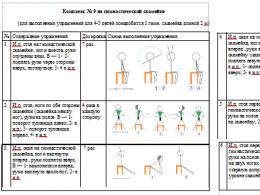How many grams of protein to eat. White captivity: how much protein do you need per day
Friends, today we will please you with the next issue of theoretical material about bodybuilding. Namely, we will analyze how much protein should be consumed per day for the most effective growth of muscle mass. So let's go.
What is protein?
Protein (from English - protein) is an organic substance that consists of a set of amino acids. Amino acids are organic compounds composed primarily of acids. There are several hundred of them, but only a couple of dozen are actively used to build the cells of all life on planet earth. Other types of amino acids are very rare and only in certain organisms.
It should be noted here that all proteins are made up of the same amino acids, but the difference is that the order and quantity of each amino acid in a cell is different. This is also called the amino acid profile.
For example, in humans, protein structures for a whole third (30-35%) consist of only 3 amino acids - leucine, isoleucine and valine. They are also called essential BCAAs. (branched chain amino acids - amino acids with branched side chains), because the body cannot synthesize them on its own from other amino acids.
This was the introduction. Now let's move on to the recommendations for the amount of protein per day.
Is high protein intake justified?
I think many people have heard the standard figures in the region of 2 grams of protein per 1 kilogram of body weight, and some sources even indicate 3 or all 4 grams per kilogram of body weight. But really high doses of protein are simply not needed in natural bodybuilding (on our website, the main recommendations are aimed specifically at natural training). Moreover, at high doses (from 3g or more), the protein has a toxic effect on the body, especially on the kidneys.
If people using anabolic steroids can use an increased amount of protein in some periods with intensive weight gain, and this will be fully justified. Then in natural training it does not make sense, because. athletes simply do not have sharp jumps in mass gain and cannot be at all. A natural athlete gains mass steadily slowly, without sharp fluctuations. So here Need food stability.
Well, we figured out the fact that you do not need to consume an increased amount of protein. But is it possible to give specific recommendations on the quantity? Yes, it is quite possible!
Let's try to calculate how much protein we need for muscle growth. Of course, I do not pretend to have a scientific justification for my calculations, and this should not be taken as the ultimate truth, but quite interesting conclusions can be drawn.
So, it has been scientifically studied that for the normal functioning of the human body, you need to consume 0.7-0.9g of protein per kilogram of weight per day. Let's take this as a starting point. Now we need to add to this the amount that is still required for the growth of our muscles. Let's try to calculate it.
The body of an adult is approximately 70-75% water. True, it should be noted here that with age, the amount of water decreases. At birth, a person has more than 80% water, and in old age it reaches 60%.
Human muscles are about 80% water. Therefore, to build 1kg of muscle, we need about 200g of protein, but with a very good amino acid profile. Because the amount of the three main essential amino acids in food is clearly not the same as in the human body (you won't find animal protein that is 1/3 of the essential amino acids). Therefore, the amount of protein can be increased - up to 300g.
Plus, it must be added that the digestibility of protein in people is different - someone is better, and someone is worse. Let's take an average of 75-85%, and the amount of protein for 1 kg of muscle growth increases to about 350gr.
Now let's think, in how many days can a natural athlete add 1kg of pure muscle? Here it is simply impossible to give even an approximate answer ... But you can argue like this - what is the most famous (to me or someone else) How many muscles did a person gain, say, in a month? Personally, I know people who managed to gain 5-6 kg per month. Of these, there were probably 4 kilograms of pure muscle.
BUT this is either after a long rest and detraining, or for beginners who have just come to the gym, whose body has not yet adapted to the load. Natural athletes who have been doing the right thing for a year or more will most likely not have such gains in mass (more precisely, muscles). At least, I have not met such people.
Okay, we'll even take the highest possible (I would even say unrealistic) results in 4kg of pure muscle per month. And in addition, we get just the same calculated 350g of protein per week for 1kg of muscle. We divide by 7 days and we get 50g per day.
That is, if a person weighs 80kg and for basic life support, he needs to eat about 70g of protein per day, then you need to add to this diet 50gr, and it turns out 120gr protein per day.
And this is just 1.5g per kilogram weight! And this is on condition that he will gain weight at a crazy pace and taking into account the poor amino acid profile of the food and the incomplete digestibility of protein !! That is, even at the same time, 2 grams is not even close!
Therefore, eating more than 2 grams of protein is simply unwise. (you will essentially be translating products), firstly. And secondly, you create an unnecessary increased load on the body.
Thus, we can conclude the following: for a natural athlete, it will be more than enough to use 1.5-1.7gr protein for every kilogram of your weight, and this is still with a fairly large margin.
By the way, here is an interesting video on this topic, we advise you to watch it:
This article comes to an end. And now you know exactly what protein is, what it is for and how much it needs to be consumed per day for effective muscle growth!
P.S. if you have any questions or just want to ask us about something - please ask questions in the comments, or you can use the feedback form - for this, go to the "Contacts" section.
Your personal trainer online
Important! If you are determined to achieve the result and want to achieve your goal in the shortest possible time (lose weight / dry your body, gain muscle mass, or just lead a healthy lifestyle and have an athletic physique, correctly compiling a diet / nutrition plan, training program and daily routine), then use the services personal fitness trainer online ==>
At the beginning of a healthy lifestyle, a novice athlete is always bombarded with a huge amount of incomprehensible information. New information about how to eat, how to exercise, how much sleep ... and so on, and so on for each area. One of the first problems is the question of how much protein should be consumed per day if you are starting to do fitness and build muscle. We will answer this question easily and clearly!
First, how many calories do you need per day?
First, calculate your daily calorie intake. It's very easy to do this.
How much protein do you need per day?
Men's magazines and magazines for bodybuilders have made it a rule to give such an answer to the question of how much protein you need per day: for muscle growth, you need to consume 2 g of protein per 1 kg of body. This figure has settled down and has become a common place in the theory of bodybuilding and bodybuilding. Moreover, even more often there is information that for this figure it is necessary to increase as much as possible.
Institutions that are not associated with sports and muscle building have completely different information on this matter. The World Health Organization recommends that healthy modern adults consume 0.75 g of protein per 1 kg of body weight. And yes, we are talking about men, in women this dose fluctuates at the level of 0.5 g of protein per 1 kg of body weight. Rospotrebnadzor of Russia measures the norms differently: in our Russian climate, an adult man is recommended to consume from 60 g to 120 g of protein per day. Quite a spread, isn't it? The following information also appears: consuming more than the indicated amounts of protein is simply harmful: the kidneys will not cope and the liver will go haywire.
But there are not so many patients among bodybuilders who die from protein overkill, despite the fact that many consume 300-500 g per day (and you also add steroids that are unhealthy here). So, health problems with an overabundance of protein are a myth? And what should an ordinary person who wants to build a healthy and beautiful body do? How much does he need? And how can he even draw any conclusions when it is clear from the foregoing: the average person consumes too little protein per day, and bodybuilders - too much?
Safe protein intake
We read the theory about how much protein you need per day, and here's what we found out: there is no link between increased protein intake and heart disease (in fact, high protein intake reduces the risk of coronary heart disease). The only indisputable link between high fat intake and heart disease is fairly accurate and proven. With a protein intake of about 2 g per 1 kg of body weight, no diseases of the kidneys, liver, heart and bones were detected in the short term. People have also been observed using protein in the amount of 2.8 g per 1 kg of body weight - and what do you think? No kidney problems in the short term.
It has been proven that high protein intake does not have a negative effect on the kidneys.
There is another opinion: excessive protein intake leaches calcium from the body. Studies have shown that there is no difference between 50 g per day and 150 g in the field of calcium excretion. It can be taken as an axiom: the consumption of protein in the amount of plus or minus 2 g per 1 kg does not have any negative impact on health. And yes, men's magazines, in general, are right: to increase muscle, it is worth consuming exactly this amount! Moreover: if you consume more than 3 g per 1 kg of body (+40% of calories), you will not harm the body, and, accordingly, the muscles will grow larger and faster! You decide.
How much protein to eat in one meal?
According to research, muscle protein synthesis increases depending on the dose of protein supplied at a time. Muscle protein synthesis can be stimulated with a maximum of 3-4 g of the branched chain amino acid leucine, which is equal to 0.05 g per 1 kg of leucine. This means that to get 3-4 g of leucine you need 30-50 g of protein. Approximately this amount of protein you should consume in 1 meal.
How often should you eat protein?
This question, accordingly, fights with the question of how often you need to eat in general. The stimulation of protein synthesis can be repeated every 3-4 hours - so often you should eat.
If you focus on daily workouts, then you should consume protein like this:
- Before the start of strength training (30-40 minutes before)- 0.3-0.4 g per 1 kg
- During a workout- 10-12 g
- After workout- 0.3-0.5 g per 1 kg.
Learning to balance
We have already learned that a high protein intake will not cause you physical harm. But there is another extreme: with high use  protein intake of carbohydrates, logically, low. Low carbohydrate intake will still lower your performance: what's the point of increasing the amount of protein if the main source of energy is still not enough? It's not for us to tell you how life is on a low carbohydrate intake: bad mood and reduced immunity are just the tip of the iceberg. Plus, with a low carbohydrate intake, the body will not be able to quickly recover from a workout, which means that you will train less often and less intensively, and all efforts to increase the amount of protein will be pointless.
protein intake of carbohydrates, logically, low. Low carbohydrate intake will still lower your performance: what's the point of increasing the amount of protein if the main source of energy is still not enough? It's not for us to tell you how life is on a low carbohydrate intake: bad mood and reduced immunity are just the tip of the iceberg. Plus, with a low carbohydrate intake, the body will not be able to quickly recover from a workout, which means that you will train less often and less intensively, and all efforts to increase the amount of protein will be pointless.
Oddly enough, carbohydrates have no less and almost more influence on muscle growth than proteins. Moreover, fats cannot be excluded from the diet - none of the macronutrients can be excluded, all of them are of great importance for the human body and especially the body of an athlete carrying overload.
***
If you use protein not from chemistry and cocktails, but more from foods high in leucine - eggs, milk, some types of meat, then less percentage of the substance is required for successful muscle growth. Simply put, the higher the quality, the less you need. Keep this in mind as you build your new champion diet!
As you know, daily protein intake is necessary for maintaining health and proper functioning of the body. And if you want to lose weight, build muscle, improve your appearance or body capabilities, protein (and its amount) becomes even more important.
Now that you know why you need it, the question is "how much?". More specifically, how much protein your body needs to achieve a specific goal.
So let's answer the question...
How much protein should a person eat per day?
For most ideal daily protein intake is: 1.6-3.0 g per kg of body weight.
Of course, this range is quite wide. Here are guidelines on how to narrow it down to what you need.
Recommended amount of protein per day based on starting fitness and goals
| Man, his physical form and goals | Ideal Daily Protein Intake |
| man or woman), who leads a predominantly sedentary lifestyle and almost does not play sports. This is the minimum daily amount of protein to maintain the overall health/function of the body. |
1,0-1,4 grams of protein per kg of body weight. |
| The average healthy adult ( man or woman) who regularly performs non-intense physical exercise or tries to improve his body (lose excess weight, build muscle, etc.). This is the minimum recommended amount. |
1,6-2,0 grams of protein per kg of body weight. |
| Average healthy adult woman |
2,0-2,4 grams of protein per kg of body weight. |
| Average healthy adult the male , whose main goal is to build muscle mass, make muscles more prominent and “dry”, increase endurance or performance. |
2,0-3,0 grams of protein per kg of body weight. |
If you're still in doubt, the "2g protein per kg bodyweight" recommendation that has reigned in the fitness world for decades is an average protein intake that's good enough for most people.
So, in order to find out how much protein you need every day, you should multiply your current body weight (in kilograms) by the amount of protein recommended in the table above.
Here are 2 examples:
- A woman weighing 65 kg who wants to build muscle, make them more prominent or get rid of excess fat (while maintaining muscle mass), should multiply 65 by 2.0-2.4. Daily protein intake in her case will be about 130-156 g per day.
- A 90 kg man who wants to increase muscle volume, maintain muscle during weight loss, or improve endurance/performance should multiply 90 by 2.0-3.0. Daily protein intake in his case will be about 180-270 g per day.
To put it even simpler, multiply your current body weight in kilograms by the generally accepted figure. As a result, you will get a range of the amount of protein that you need to consume per day.
Have you counted? Awesome! We have now figured out your daily protein requirement.
*Note*
For overweight people, the ideal amount of protein, when calculated using current body weight, will be inflated due to excess fat. Therefore, for those who are obese, a target body weight should be used. For example, a person weighing 150 kg, wishing to lose weight to 100, should use a weight of 100 kg in calculating the daily requirement.
As long as you stay within this "ideal" range, your protein intake will fully meet your needs and you'll get the best possible results as a result.
The next thing you need to know is a list of foods that should be present in your daily diet.
Examples of High Protein Foods

The following is a short, basic list of the most common high protein foods:
- Chicken (without skin);
- Turkey meat (without skin);
- Fish (all types);
- Beef (lean);
- Pork (lean);
- Whole eggs;
- Egg white;
- Protein supplements (whey protein powder, casein powder, protein bars, etc.);
- Legumes (all kinds);
- Nuts (all types);
- Milk;
This is not a complete list of foods that contain protein, but any of them will cover most of your needs. Just choose the ones you like the most.
How Protein Affects Total Daily Calories
Now that you know how much protein you need and what foods you can get it from, the last step remains. You need to calculate how many calories per day you get from protein. Don't worry, it's simple.
The only thing to know: 1 g of protein contains 4 calories.
Now you need to multiply the grams of daily amount of protein calculated earlier by 4 to find out exactly how many calories you will receive. Here are some examples:
- Take the 65 kg woman from the previous example. She consumes 130 g of protein per day. We get 130 x 4 = 520. In this example, 520 calories of total daily intake will come from protein.
- Now a 90 kg man. He consumes 220 grams of protein per day. We get 220 x 4 = 880. In this example, 880 calories of total daily calories will come from protein.
Now it's your turn. Multiply the ideal amount of protein that you calculated a minute ago by 4. That's how many calories you will have in your daily diet for protein.
This step may seem pointless or confusing, but don't worry. This will help you with other calculations to come up with the perfect meal plan.
According to materials:
http://www.acaloriecounter.com/diet/how-much-protein-per-day/
How much protein per day does a person need per 1 kg of body weight? Protein plays an important role in the nutritional plan of any person. Especially for an athlete, as it supports the body's efforts to create energy and helps the body recover from hard training.
Powerlifting focuses on the amount of weight an athlete can lift in three sets: deadlift, squat, and bench press.
You can achieve good results not only with a progressive training program, but also with a well-thought-out nutrition program.
Protein is present in every cell of the human body. Therefore, each person needs a minimum amount of protein daily to maintain life processes and tissue growth.
How much protein per day does a person need per 1 kg of body weight
To determine how much protein a person needs per 1 kg of body weight per day, one should understand what protein is.
- What is protein made of? It is made up of amino acids. Complete proteins contain all the essential amino acids. Those that the human body cannot produce on its own, in ideal proportions to support muscle growth.
Examples of a complete protein include eggs, meat, poultry, fish, dairy, and soy products. Incomplete proteins lack one or more essential amino acids. Most plant sources of protein are incomplete, including beans, nuts, and grains.
- How much protein does a person need per day to get all the necessary amino acids? First, you will get all the essential amino acids if you eat a variety of proteins that the body needs. The International Society for Sports Nutrition notes how much protein a person needs per day: “For good health, a person needs an average of 0.8 grams of protein per 1 kg of body weight per day.”
Accordingly, athletes need more protein, which allows them to maintain life processes and create new cellular tissues. Athletes such as cyclists and marathon runners should consume 1 to 1.5 grams of protein per 1 kg of body weight per day.
How much protein should a powerlifter eat per day? A bodybuilder is recommended to take 1.5 to 2 grams of protein per 1 kg of body weight per day.
How much protein does a person need per day with a body weight of 80 kilograms? With a body weight of 80 kg, it is necessary to consume from 131 to 164 grams of protein per day with food. This increased protein intake will not compromise kidney or bone function, as long as you are in excellent health. Otherwise, talk to your doctor about the health safety of a high-protein diet.
Divide your protein intake into several meals and snacks. You may find it easiest to eat 20 to 40 grams of protein at each meal.
Eat small meals over 2-3 snacks. Specify how much protein is present and in what food. It is best to get proteins from natural foods rather than supplements.
Whole foods should provide most of the vitamins and minerals for good health. Whey proteins, casein and egg powder, as well as soy protein are high quality protein sources.
When planning a protein diet, include proteins with a high content of amino acids: leucine, valine, isoleucine. These specific amino acids play an important role in the recovery process of the body and the restoration of glycogen, as well as carbohydrates in the muscles. Whey protein is especially rich in proteins.
Therefore, a 20-40 gram serving before and after an intense workout helps maximize muscle protein synthesis (the process by which muscles grow). Proteins contribute to the faster removal of soreness from the muscles after a hard workout.
The maximum benefit is achieved when eating protein meals 90 minutes before training and within 90 minutes after training.
Include some good quality carbs to provide energy and replenish glycogen stores after a workout. Such as whole grains, starchy fruits and vegetables.
While post-workout carbs may not significantly improve muscle protein synthesis, they can meet your total daily carbohydrate requirement. Eggs with oatmeal, potatoes with ground beef, banana with will be good fuel. After a workout, you can take whey protein mixed with milk and berries, or brown rice with tuna and broccoli.
Cautions
With intensive consumption and prolonged use of protein foods and a large number of calories, sugar, saturated fat, refined grains, complications such as type 2 diabetes, as well as cardiovascular disease, are possible.
Try to always add to protein nutrition, whole grains, dairy products. Healthy unsaturated fats found in nuts, seeds, avocados, olive oil, oily fish. They will increase your daily calorie intake and provide your body with energy.
Avoid saturated fats. They are found in full in fatty dairy products or in fatty meat. Also cut out fast foods, which can compromise your cardiovascular system, whether you're healthy or not.
So, having learned how much protein a person needs per day, you can plan your individual diet.







